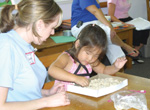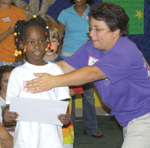
Return to Main Menu
|
Communication camp builds self
confidence
by Cindy
Abole
Public
Relations
The value of summer camps for children is regarded as both fun and
positive in helping build a child’s self-confidence and other social
attributes.
 Lynn
Cagle, a second-year graduate student with the Communication Sciences
and Disorders Program in the College of Health Professions, helps Jeni
Kim, 5, build a sand castle during Camp Communication Vacation July 17
- 21. Jeni has a cochlear implant in her right ear that allows her to
hear only in that ear. Cagle uses auditory-verbal therapy when
interacting with Jeni. Lynn
Cagle, a second-year graduate student with the Communication Sciences
and Disorders Program in the College of Health Professions, helps Jeni
Kim, 5, build a sand castle during Camp Communication Vacation July 17
- 21. Jeni has a cochlear implant in her right ear that allows her to
hear only in that ear. Cagle uses auditory-verbal therapy when
interacting with Jeni.
For a group of 13 Lowcountry children who are hearing impaired, the
experience of a weeklong activity camp to interact and play with others
much like themselves and to reinforce educational skills was especially
precious.
Each summer since 1999, Lowcountry children who are deaf or hard of
hearing have been a part of Camp Communication Vacation, a summer camp
organized by the College of Health Professions’ Communication Sciences
and Disorders (CSD) program. The camp was held at Second Presbyterian
Church in downtown Charleston. Transportation for campers was provided
by MUSC Transportation Services.
For five days the children, ages 4 to 12, play and interact with other
hearing-impaired children, speech-language pathologists, audiologists,
deaf education teachers and CSD graduate students. This year’s theme
was: “Seasons: Let’s hear all year.”
 Amy Cario, a
teacher for the deaf with the Charleston County schools,
directs Jenette Clayton, a hearing-impaired student, during a
relay
activity with other children. Amy Cario, a
teacher for the deaf with the Charleston County schools,
directs Jenette Clayton, a hearing-impaired student, during a
relay
activity with other children.
“This was a wonderful opportunity for children with hearing loss to
come together and have fun,” said Nevitte Swink, speech-language
pathologist with MUSC’s Cochlear Implant Center. This is Swink’s fourth
year of involvement with the camp. “The camp focuses on activities that
aid in developing the children’s listening and language skills.”
Both large and small group activities were incorporated to address the
learning objectives and seasons theme. A different season was
introduced each day with season-appropriate activities and vocabulary.
Each day began with a group welcome, announcements and review of the
day’s activity schedule.
Activities were scheduled in 30-minute increments and included group
games and sports, art and language activities, inventive and
interactive snack time, and seasonal story time using puppets, role
playing, etc. At the end of the day, the children gathered once more to
review their accomplishments and honor two or three campers with
special awards. Award recipients received a certificate and were
encouraged to run a victory lap around the camp participants before
departing. As a special feature, each camper receives a daily
newsletter to take home to their parents summarizing the day’s
activities and preparing them for the next day.
“Being involved with camp puts a realistic spin on what we learn in the
classroom,” said Melissa Montiel, a second-year CSD student and one of
27 graduate students who helped with the camp. “It gave us a rare
opportunity to work closely with a special patient group and learn from
them.”
The camp’s final day is a showcase of activities coordinated by the
campers and professional staff. It included skits, activities, awards
and cake.
“Watching the parents’ reactions during the Friday Finale is
rewarding,” said Laurel H. Hays, assistant professor and director of
clinical education, College of Health Professions. “Each year, our goal
is to provide a beneficial experience for the campers, their families
and the CSD graduate students. It’s definitely a win-win for everyone.”
Other sponsors for Camp Communication Vacation included Mount Pleasant
Sertoma Club and Advanced Bionics Corp. (manufacturer of cochlear
implant devices), and the Department of Otolaryngology, Division of
Audiology.
Camp Communication Vacation
Professional Staff
Abby Connell, audiologist and coordinator of MUSC’s Cochlear Implant
Team, Department of Otolaryngology; Laurel Hays, Communication Sciences
and Disorders, College of Health Professions; Jack King and Kimberly
Snyder, Department of Otolaryngology, Division of Audiology; Nevitte
Swink and Starr Carr, Department of Therapeutic Services, Division of
Speech-Language Pathology; Amy Cario and Cindy Leal, teachers of the
deaf, Charleston County School District; and Patti Weathers,
audiologist, Aural Preschool, Westview Middle School, Berkeley County
School District
Friday, July 28, 2006
Catalyst Online is published weekly,
updated
as needed and improved from time to time by the MUSC Office of Public
Relations
for the faculty, employees and students of the Medical University of
South
Carolina. Catalyst Online editor, Kim Draughn, can be reached at
792-4107
or by email, catalyst@musc.edu. Editorial copy can be submitted to
Catalyst
Online and to The Catalyst in print by fax, 792-6723, or by email to
catalyst@musc.edu. To place an ad in The Catalyst hardcopy, call Island
Publications at 849-1778, ext. 201.
|


